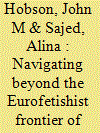|
|
|
Sort Order |
|
|
|
Items / Page
|
|
|
|
|
|
|
| Srl | Item |
| 1 |
ID:
157535


|
|
|
|
|
| Summary/Abstract |
This article argues that Critical IR theory’s (CIRT) claims to reflexivity, its engagement with “difference,” and its emancipatory stance are compromised by its enduringly Eurocentric gaze. While CIRT is certainly critical of the West, nevertheless its tendency toward “Eurofetishism”—by which Western agency is reified at the expense of non-Western agency—leads it into a “critical Eurocentrism.” While this Eurofetishism plays out differently across the spectrum of CIRT, nevertheless all too often the West is treated as distinct from the non-West such that a fully relational conception of the West—one in which the non-West shapes, tracks, and inflects the West as much as vice versa—is either downplayed or dismissed altogether. Our antidote to this problem is to advance such a relational approach that brings non-Western agency back in while simultaneously recognizing that such agency is usually subjected to structural constraints. This gives rise to two core objectives: first, that non-Western agency needs to be taken seriously as an ontologically significant process in world politics, and second, that it needs to be explored in its complex, manifold dimensions. Here we seek to move beyond the colonial binaries of non-Western “silence vs. defiance” and an “all-powerful West vs. powerless non-West.” For between these polarities lies a spectrum of instantiations of non-Western agency, running from the refusal to be known and categorized by colonial epistemes to mundane moments of everyday agency to the embrace of indigenous cosmologies through to modes of developmental and global agency. Sometimes these speak back to the West, and at other times they occur for reasons Other-wise. Ultimately we call for a relational sociology of global interconnectivities that problematizes CIRT’s Eurofetishization of the West as a separate, self-generating, self-directed, and hyper-autonomous entity.
|
|
|
|
|
|
|
|
|
|
|
|
|
|
|
|
| 2 |
ID:
117758


|
|
|
|
|
| Publication |
2012.
|
| Summary/Abstract |
In recent years, IR has been increasingly influenced by the critics of Eurocentric assumptions of the epistemologies of social science. The awareness of the perspectival nature of knowledge and the emphasis on aspects of colonialism previously unaccounted for, such as epistemological imperialism, led to the flourishing of approaches which, despite their differences, are connected by their common interest in subaltern voices and suppressed knowledges, their anti-hegemonic inclination, and their emphasis on the emancipation of the Other.
Post-Western IR theory is largely the offspring of such theoretical investigations and shares the ethical concerns of this critical tradition. The article identifies three strands of post-Western engagement: pluralism, particularism and postcolonialism. It focuses on postcolonialism because of the radical promise it represents on the one hand, and of the disconcerting implications of its epistemology on the other. Through the engagement with one of the most significant post-Western epistemological projects, Chakrabarty's Provincializing Europe, the article demonstrates why the 'post-Western' question as dealt with by postcolonialism is a compelling conundrum for critical thinking. This is because the ultimately postsecular stance and singularising ethics adopted by such approaches are paralysing for the practice of social science and for a relational consideration of alterity, which can be served more efficiently by reference to a genuine universalism.
|
|
|
|
|
|
|
|
|
|
|
|
|
|
|
|
|
|
|
|
|